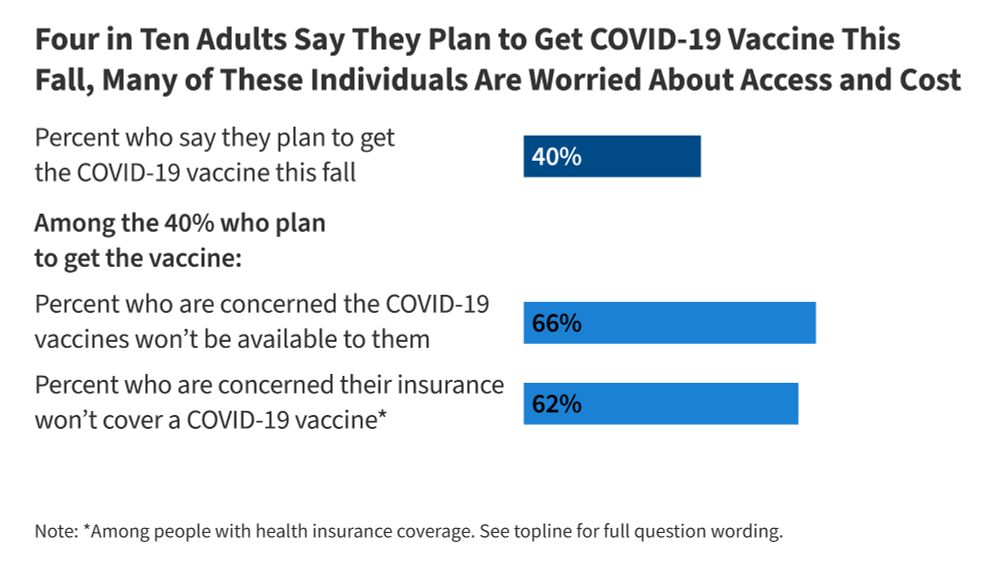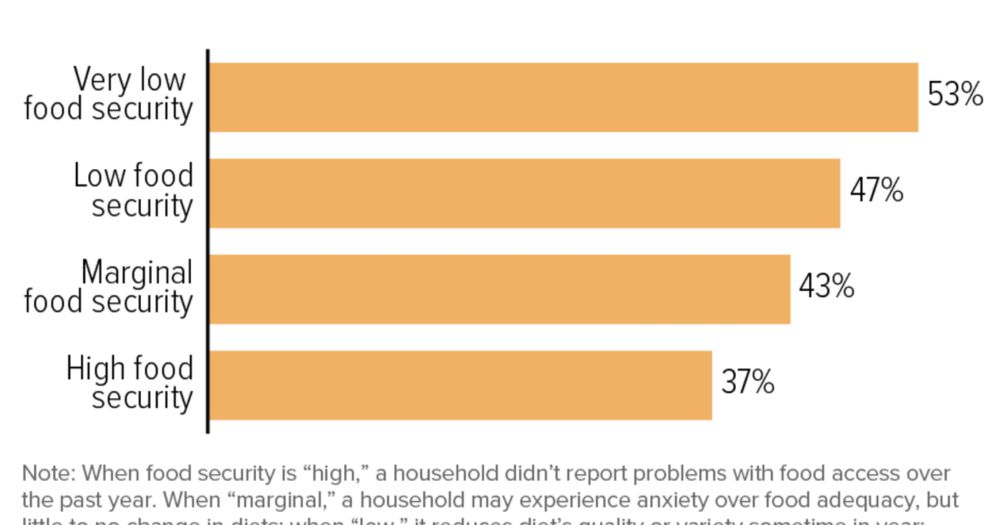I've been collecting examples of when AI goes wrong so that I can inform students of its shortcomings and explain why I am not allowing it in my courses.
Here's another one to add to the pile.
31.07.2025 13:37 — 👍 1 🔁 0 💬 0 📌 0
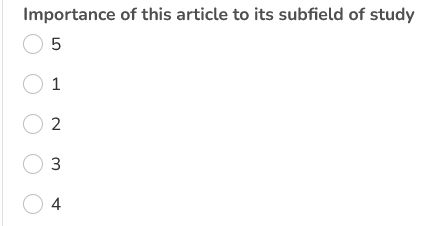
Importance of this article to its subfield of study
5
1
2
3
4
As if doing peer-reviews isn't already time consuming, now, I need to be a mind reader.
Any guesses whether "5" or "1" indicates high importance?
30.07.2025 18:26 — 👍 1 🔁 0 💬 0 📌 0
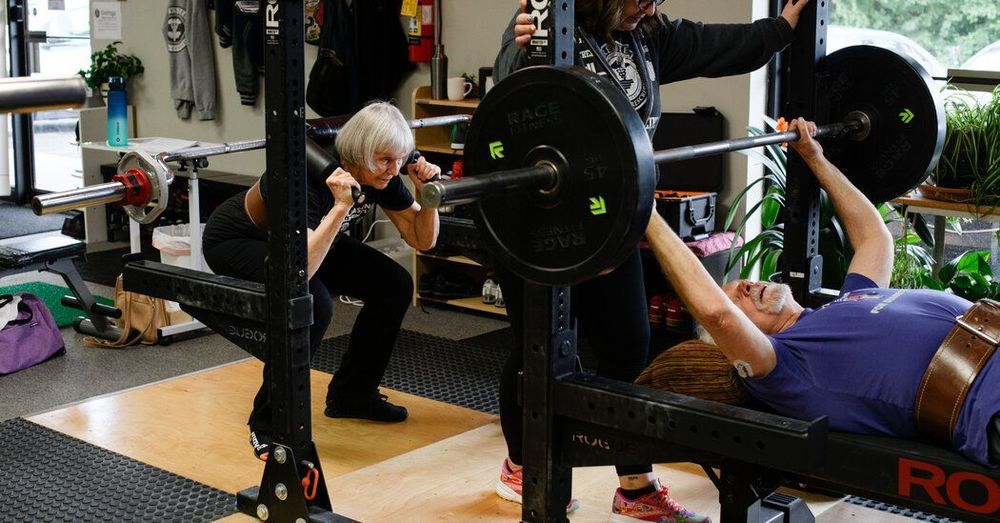
Pumping Iron Is Their Secret to Aging Well
via NYT
Greysteel, a gym outside Detroit, teaches barbell lifting for older people. Some are well into their 80s and 90s.
www.nytimes.com/2025/07/26/w...
28.07.2025 18:00 — 👍 1 🔁 2 💬 0 📌 0
The reality is that the only thing that can reduce homelessness, mental illness, and addiction is more housing, more investment in shelters, and building more mental health infrastructure. That’s it. You can’t address homelessness without houses and you can’t address illness without healthcare.
25.07.2025 15:40 — 👍 478 🔁 144 💬 9 📌 4
As a kid, I was on SNAP (aka food stamps, I remember when they still looked like Monopoly money) and Medicaid. I ate free lunch all through school. I believe that these programs are morally imperative, but, regardless of one's own values, they are simply good social, health, and economic policy.
22.05.2025 19:30 — 👍 9 🔁 2 💬 1 📌 2
Only 16% of US adults think that federal funding for scientific research done by universities should be decreased. The public wants and values scientific advancements.
21.05.2025 17:41 — 👍 8 🔁 4 💬 0 📌 0
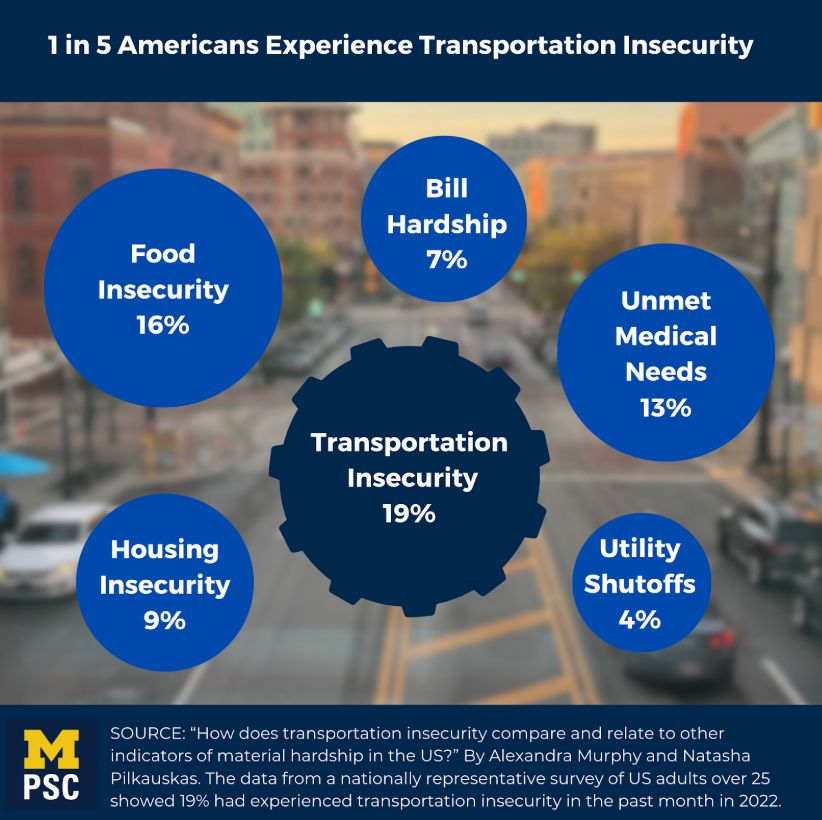
Affecting 1 in 5 people, transportation insecurity is America's overlooked hardship. New research from Alexandra Murphy and @natashap.bsky.social uses the Transportation Security Index to provide insights on this prevalent challenge. #EconSky #PolicySky psc.isr.umich.edu/news/transpo...
30.04.2025 18:51 — 👍 15 🔁 10 💬 0 📌 1
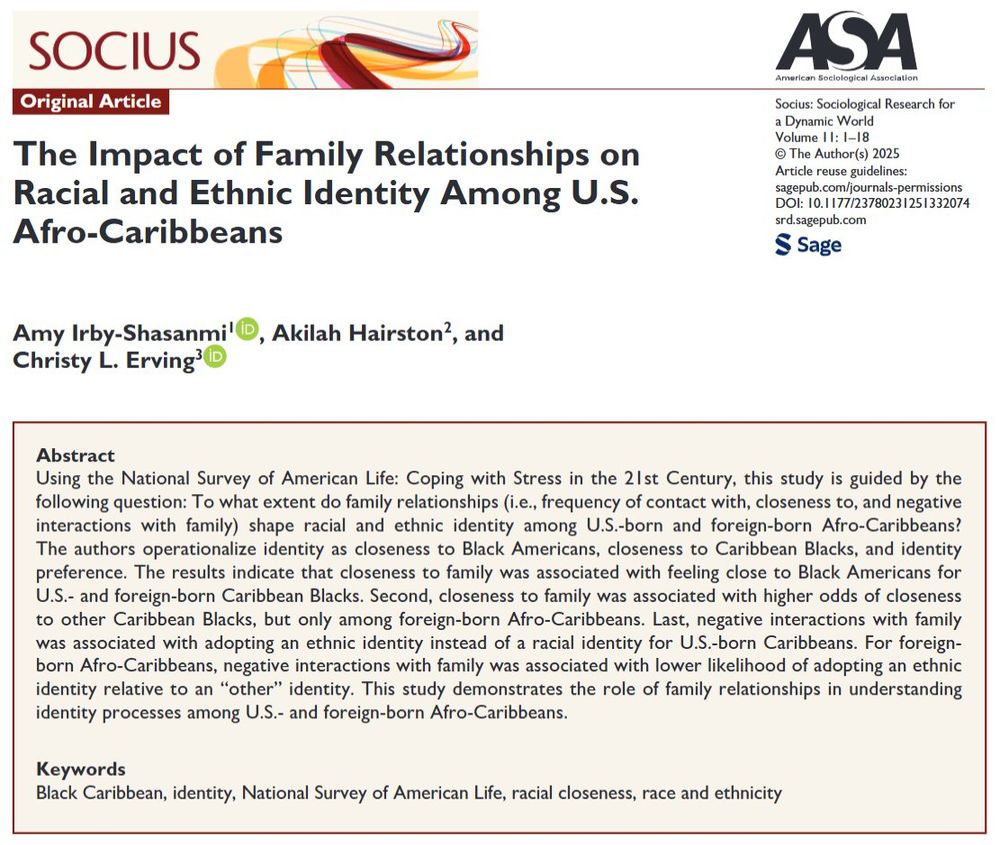
🫂 #FamilyRelationship shape #RacialIdentity among #AfroCaribbean individuals.
New #Socius study by Drs. Irby-Shasanmi, Hairston & Erving finds closeness builds solidarity; conflict divides U.S.-born and foreign-born.
Read: doi.org/10.1177/2378...
29.04.2025 17:23 — 👍 1 🔁 1 💬 0 📌 0
An update to show the seismic crash in NIH funding. The left side shows NIH has issued almost no "new" awards since Trump took office. Even renewals (you receive a 5 year award, but each year they renew it), which should be mushed into the lines above it, is shockingly low.
24.04.2025 13:53 — 👍 114 🔁 59 💬 5 📌 5
Just in case it is helpful, it is totally appropriate to reach out to the decision editor for guidance when you have reviews that are contradictory and/or nonsensical. Editors are looking at the reviews holistically, while authors (who must respond point-by-point) are looking at them individually.
24.04.2025 13:47 — 👍 2 🔁 0 💬 0 📌 0
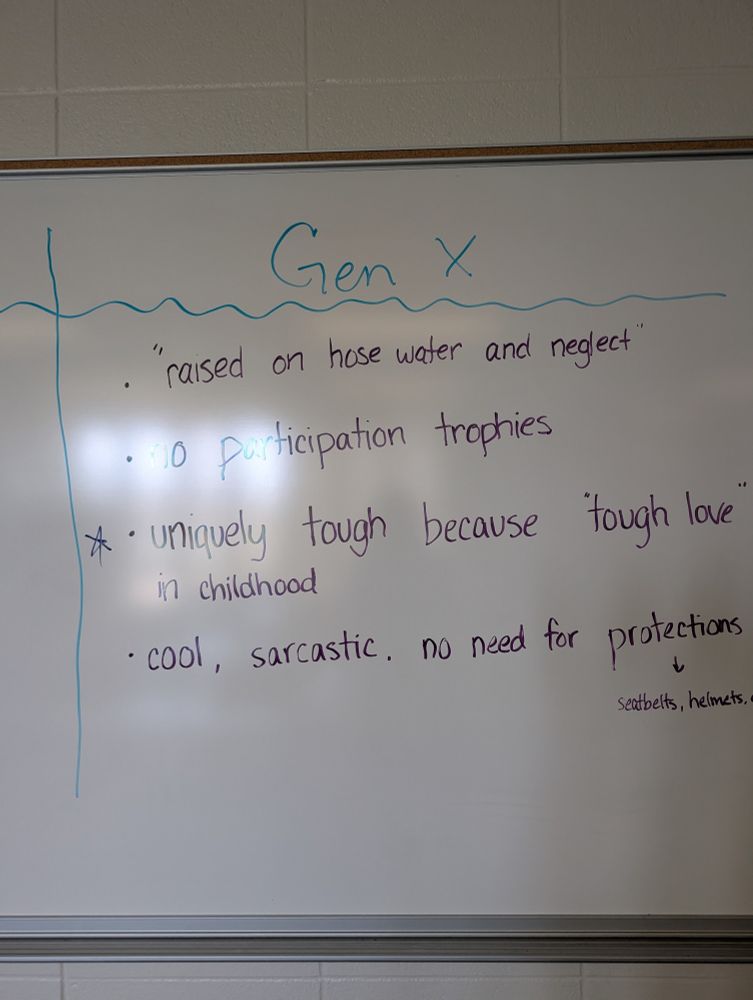
Picture of white board with following text:
Gen X
"raised on hose water and neglect"
no participation trophies
uniquely tough because of 'tough love" in childhood
cool, sarcastic, no need for protections (seatbelts, helmets, etc.)
We did an activity in my #Sociology of Aging & the Life Course class, where students had to use social media to analyze generational identities among cohorts. It was a fun activity, and the #GenX responses were just too good not to share.
"Raised on hose water and neglect" belongs on a t-shirt
23.04.2025 10:10 — 👍 5 🔁 0 💬 2 📌 0
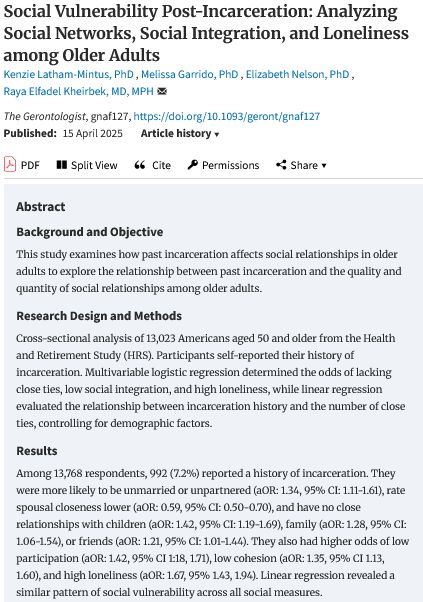
Background and Objective
This study examines how past incarceration affects social relationships in older adults to explore the relationship between past incarceration and the quality and quantity of social relationships among older adults.
Research Design and Methods
Cross-sectional analysis of 13,023 Americans aged 50 and older from the Health and Retirement Study (HRS). Participants self-reported their history of incarceration. Multivariable logistic regression determined the odds of lacking close ties, low social integration, and high loneliness, while linear regression evaluated the relationship between incarceration history and the number of close ties, controlling for demographic factors.
Results
Among 13,768 respondents, 992 (7.2%) reported a history of incarceration. They were more likely to be unmarried or unpartnered (aOR: 1.34, 95% CI: 1.11-1.61), rate spousal closeness lower (aOR: 0.59, 95% CI: 0.50-0.70), and have no close relationships with children (aOR: 1.42, 95% CI: 1.19-1.69), family (aOR: 1.28, 95% CI: 1.06-1.54), or friends (aOR: 1.21, 95% CI: 1.01-1.44). They also had higher odds of low participation (aOR: 1.42, 95% CI 1:18, 1.71), low cohesion (aOR: 1.35, 95% CI 1.13, 1.60), and high loneliness (aOR: 1.67, 95% 1.43, 1.94). Linear regression revealed a similar pattern of social vulnerability across all social measures.
Discussion and Implications
Older adults with a history of incarceration are at increased risk of social isolation and loneliness. Targeted interventions could improve their social integration and well-being.
Hot off the press!
Using data from the Health & Retirement study, we find that older adults with incarceration histories experience more social vulnerability (e.g., smaller social networks/more social isolation, less community integration, and more loneliness).
doi.org/10.1093/gero...
15.04.2025 20:57 — 👍 12 🔁 3 💬 0 📌 0
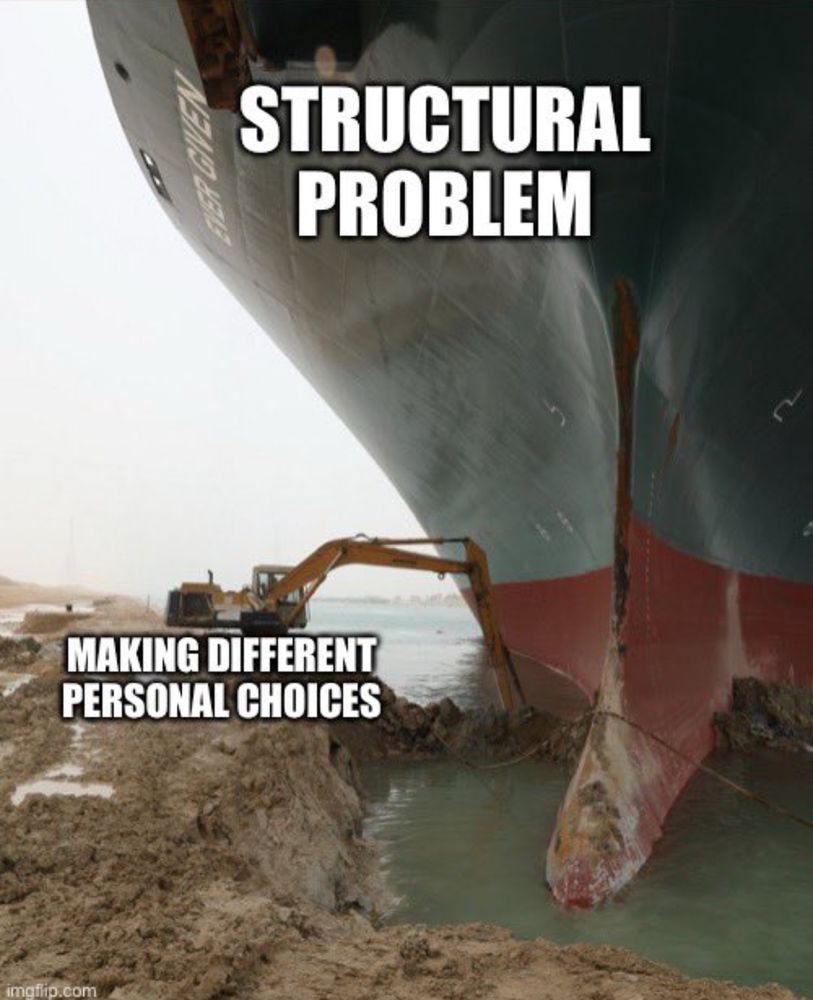
Photo of the stuck Ever Given-labeled Structural Problems”-with a small digger-labeled “Individual Choices”-trying but failing to dislodge it.
As a sociology professor, this hits hard. I still sometimes use it.
24.03.2025 11:16 — 👍 233 🔁 52 💬 1 📌 6
Just as a friendly reminder, over 40% of Americans 65+ rely on Social Security for the majority of their income (SSA, 2025)
Disabled workers also account for 11% of Social Security benefits (SSA, 2025)
Social Security lifts more people out of poverty than any other program (Romig, CBPP, 2025)
05.03.2025 12:51 — 👍 0 🔁 0 💬 1 📌 0
I'm going to take a second to brag about my #Sociology capstone students. I created an assignment called "Structural Solutions for Structural Problems," where I asked them to share a successful, recent example of social change through claimsmaking. It was such an inspirational assignment to grade.
27.02.2025 16:18 — 👍 6 🔁 0 💬 0 📌 0
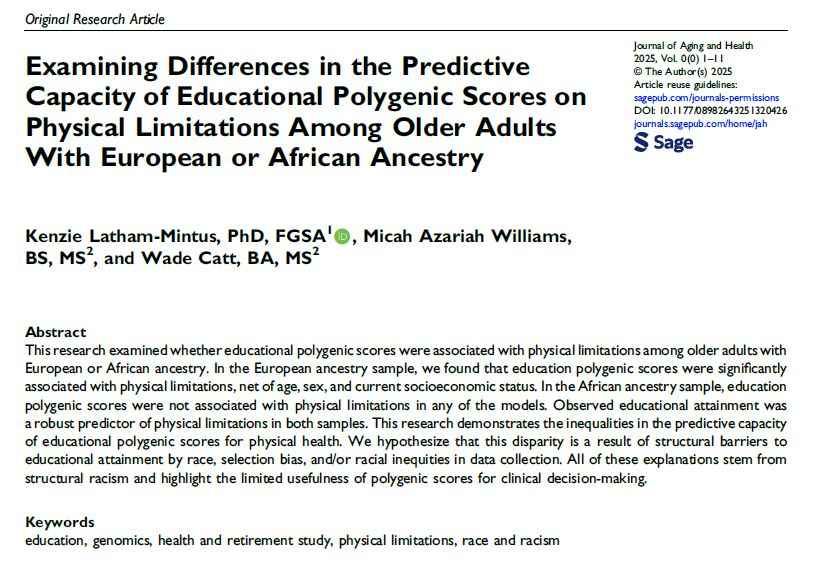
Examining Differences in the Predictive Capacity of Educational Polygenic Scores on Physical Limitations Among Older Adults With European or African Ancestry
Kenzie Latham-Mintus, PhD, FGSA¹, Micah Azariah Williams, BS, MS², and Wade Catt, BA, MS²
Abstract
This research examined whether educational polygenic scores were associated with physical limitations among older adults with European or African ancestry. In the European ancestry sample, we found that education polygenic scores were significantly associated with physical limitations, net of age, sex, and current socioeconomic status. In the African ancestry sample, education polygenic scores were not associated with physical limitations in any of the models. Observed educational attainment was a robust predictor of physical limitations in both samples. This research demonstrates the inequalities in the predictive capacity of educational polygenic scores for physical health. We hypothesize that this disparity is a result of structural barriers to educational attainment by race, selection bias, and/or racial inequities in data collection. All of these explanations stem from
structural racism and highlight the limited usefulness of polygenic scores for clinical decision-making.
Self-promotion feels odd with so much chaos in the world, but I worked with two terrific students who deserve recognition.
We find that educational polygenic scores are predictive of physical limitations among older adults with European ancestry, but not among those with African ancestry.
26.02.2025 15:28 — 👍 6 🔁 2 💬 1 📌 0
1/ I am seeing a lot of comments on the slashing of NIH support along the lines of “universities should just spend their huge endowments.”
I’m the last person to cheer on the institutional stratification rising endowments have contributed to. But let me explain why this is not a solution.
18.02.2025 13:48 — 👍 1261 🔁 533 💬 45 📌 121
I just added some new folks. Let's keep the momentum going. Please let me know if you would like to be added.
#gerosky #gerontology #socialgerontology
go.bsky.app/KnsmUGh
14.02.2025 16:42 — 👍 3 🔁 0 💬 0 📌 0
Absolutely! Done :)
14.02.2025 16:40 — 👍 1 🔁 0 💬 0 📌 0
Added :)
14.02.2025 16:15 — 👍 0 🔁 0 💬 0 📌 0
Done :)
14.02.2025 16:15 — 👍 1 🔁 0 💬 1 📌 0
Done :)
14.02.2025 16:15 — 👍 1 🔁 0 💬 2 📌 0
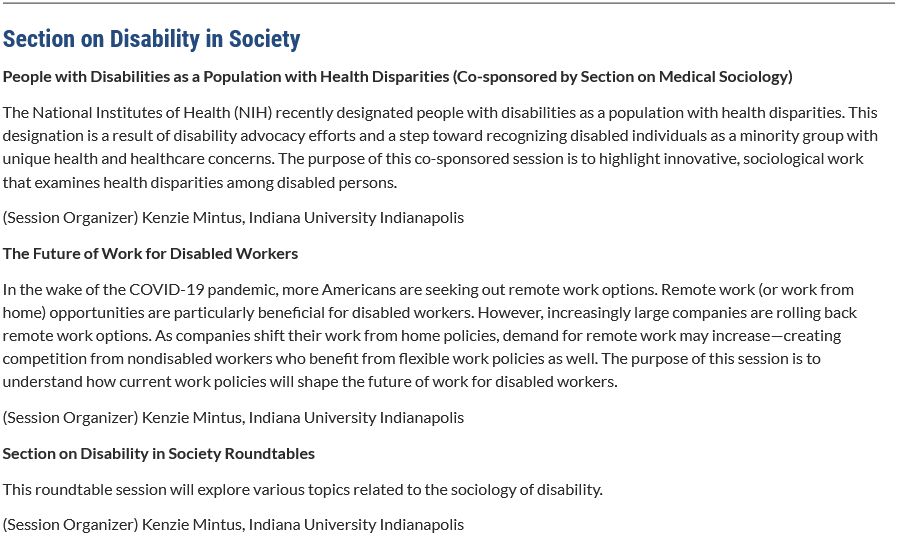
Section on Disability in Society
People with Disabilities as a Population with Health Disparities (Co-sponsored by Section on Medical Sociology)
The National Institutes of Health (NIH) recently designated people with disabilities as a population with health disparities. This designation is a result of disability advocacy efforts and a step toward recognizing disabled individuals as a minority group with unique health and healthcare concerns. The purpose of this co-sponsored session is to highlight innovative, sociological work that examines health disparities among disabled persons.
(Session Organizer) Kenzie Mintus, Indiana University Indianapolis
The Future of Work for Disabled Workers
In the wake of the COVID-19 pandemic, more Americans are seeking out remote work options. Remote work (or work from home) opportunities are particularly beneficial for disabled workers. However, increasingly large companies are rolling back remote work options. As companies shift their work from home policies, demand for remote work may increase—creating competition from nondisabled workers who benefit from flexible work policies as well. The purpose of this session is to understand how current work policies will shape the future of work for disabled workers.
(Session Organizer) Kenzie Mintus, Indiana University Indianapolis
Section on Disability in Society Roundtables
This roundtable session will explore various topics related to the sociology of disability.
(Session Organizer) Kenzie Mintus, Indiana University Indianapolis
I know there is a lot happening in the world right now, but for those of you planning to attend #ASA2025, please consider your submitting your work to our @asadisability.bsky.social sessions. We need to highlight our work & find community now more than ever. Deadline 02/26.
#Sociology #Disability
13.02.2025 18:45 — 👍 10 🔁 5 💬 0 📌 1
Dual-title PhD Candidate in Sociology and Gerontology at Purdue University
Official Bluesky account of the Journal of Health and Social Behavior (JHSB), a publication of the American Sociological Association
Integrative health equity, primary care, qualitative & multilingual research, structural competency. Medical sociologist faculty member @ UCSF School of Medicine in my day job. Parenting, plants, moving water, domestic worker movement & activism.
Assistant Professor @ purduesociology.bsky.social. 23-25 Visiting Scholar @psupopresearch. Health, life courses and institutions.
Assistant Professor of Sociology @UVM | STS | Med Soc | Social Movements | Previously Post-doc @BermanInstitute, Partners In Health
Google Scholar: https://scholar.google.com/citations?user=b_foLf8AAAAJ&hl=en
sociologist | social network researcher | still not quite sure which way is up | cyclist/swimmer | https://jimiadams.github.io/ | no, I will not subscribe to your substack
Reader | Cardiff University
Sociologist (Disability | Health and Illness | Reproduction | Stigma)
Co-Editor in Chief of 'Sociology of Health and Illness'
He | Him | His
Sociology PhD student @Vanderbilt. Singlehood, networks, policy, and health.
Sociologist at University of Toronto & University of Maryland | Past President @WFRN.bsky.social | Studying Time Use 🕒 & Wellbeing; Gender, Work & Family; Culture; Social Psychology | Author-Changing Rhythms of American Life
The official Bluesky account for the American Sociological Association Section on Medical Sociology.
https://www.asanet.org/asa_sections/medical-sociology/
Sociologist/prof @universityofky and former journalist @forbes and @billboard writing about gender, disability, stress, and mental health. Also: sailing enthusiast, angsty tween wrangler, and lover of good fiction and dogs.
Associate Professor @unosccj.bsky.social | Co-Director http://vvsrlab.org /// Research interests: #Victimology & #HumanTrafficking
Humanist, Teacher, Engaged Citizen
Director IU Indianapolis Arts & Humanities Institute
Prof. History | Africana Studies | American Studies
#c18 | #anthropocene | #skystorians | #envhist
https://jasonmkelly.com
views my own | reposts not endorsements
Associate Professor of Music and Arts Technology at Indiana University Indianapolis. Research interests include STEAM Education, Leadership, Learning Science, and Creativity. Author of Leadership in Music Technology Education.
she/her | cat mom🐈⬛ | reporter 📰
covers trending news for IndyStar ✰
never leaves home without her kindle 📚
beep me if you wanna reach me:
✉️klwiseman@gannett.com
📍Indianapolis, Indiana
Local reporter covering #Indianapolis for Mirror Indy. Tips: emily.hopkins@mirrorindy.org. Call/text/Signal: 317-790-5268.
Priors: ProPublica, IndyStar
Known elsewhere as @indyemapolis
Editor for Axios Local. Indy resident. Previously worked for WFYI, Indianapolis Business Journal. Indiana University journalism grad. Dog mom. 2x marathon runner. https://www.axios.com/local/indianapolis
Trending Reporter for IndyStar | Writer | Book Dragon | Nerd | Kindness Freak | Vegetarian | Anime Enthusiast | Dice Goblin | Retired Tricycle Pilot |
He/Him
She/her. I write books about carriages, corsets, and smartwatches. Mother of (emoji) dinosaurs 🦖🦕. 羽生結弦 fan. Fan of tea. Born at 332 ppm.
This biography should not be taken as a complete description.
courtneymilan.com
Researcher, therapist, heavily caffeinated. Frequently described as a bit of a handful. 🖤 (She/her) 🏳️⚧️ jessk.org/blog
